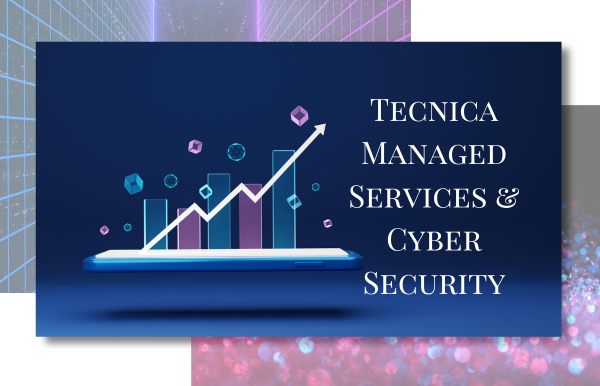Jump To
- The Confidence Advantage
- The Need for Alignment
- The Positive Impact on Security and IT Teams
- Enhancing Workload Management and Morale
- Optimising Funding and Investment
- Strategies for Collaborative Success
- Education and Awareness
- Inclusive Decision Making
- Ensuring Adequate Resourcing
- Bridging the Gap with Managed Services
- Leveraging Managed Services with Tecnica
- Conclusion
Effective leadership in IT and cyber security is more critical than ever. Non-IT leaders often bring a wealth of experience and fresh perspectives to the table, contributing to innovative approaches and strategic thinking. While their lack of technical expertise might initially seem like a hurdle, it also presents opportunities for collaboration and growth that can significantly benefit security and IT teams. This blog explores how non-IT leadership impacts these teams and highlights strategies to harness the strengths of diverse leadership backgrounds while effectively managing potential challenges.
The Confidence Advantage
Non-IT leaders frequently excel in areas like business strategy, operations, and finance, providing valuable insights that drive organisational success. Their confidence and proven track records can be powerful assets when addressing IT and cyber security challenges, especially when combined with the expertise of IT professionals.
The Need for Alignment
Appreciating Complexity: Non-IT leaders may sometimes simplify complex IT and cyber security challenges, not out of neglect, but as a natural response to prioritising broader business objectives. By developing a deeper understanding of these complexities, leaders can make decisions that balance business and security needs effectively.
Balancing Priorities: Business leaders often focus on achieving immediate goals, whereas IT and security require a long-term outlook. Recognising these different focus areas can foster more aligned priorities, ensuring both business objectives and security requirements are met.
The Positive Impact on Security and IT Teams
Enhancing Workload Management and Morale
Security and IT professionals play a critical role in safeguarding an organisation’s digital assets, a task that is ever-evolving due to the emergence of new threats. Non-IT leaders can support these teams by fostering an environment that recognises and addresses these challenges.

- Collaborative Expectations: By setting realistic expectations and providing adequate resources, non-IT leaders can help IT and security teams manage their workloads more effectively. This reduces the risk of burnout and supports a healthier work-life balance, ensuring teams remain motivated and engaged.
- Recognition and Support: Acknowledging the efforts and achievements of IT and security professionals fosters a culture of appreciation and respect. This recognition boosts morale and encourages teams to continue performing at their best.
Optimising Funding and Investment
Non-IT leaders are instrumental in securing funding and resources for IT and cyber security. By gaining a nuanced understanding of these areas, they can champion the necessary investments to protect the organisation’s digital infrastructure.
- Strategic Technology Investments: With informed decision-making, non-IT leaders can ensure that their organisations are equipped with the latest technology, reducing vulnerabilities and enhancing security. Supporting IT teams with up-to-date tools allows them to operate more efficiently and effectively.
- Commitment to Training: Recognising that cyber security is constantly evolving, non-IT leaders can advocate for continuous training opportunities. This commitment ensures that IT and security teams are always prepared to tackle new threats, contributing to the organisation’s overall resilience.
- Balanced Budgeting: A well-rounded approach to budgeting that includes both cyber security and other strategic initiatives, such as AI, allows organisations to innovate without compromising security. Non-IT leaders can lead the way in finding this balance, ensuring comprehensive protection.
Strategies for Collaborative Success
To maximise the potential of non-IT leadership in IT and cyber security, several strategies can be employed:

Education and Awareness
- Targeted Training: Offering adapted cyber security and IT training for senior leaders helps them appreciate the complexity and importance of these areas. A better understanding of cyber risks facilitates more informed and balanced decision-making.
- Regular Briefings: IT and security leaders should keep non-IT leaders informed with regular updates on current threats, vulnerabilities, and the organisation’s security posture. This ongoing dialogue promotes a culture of collaboration and shared learning.
Inclusive Decision-Making
- Cross-Functional Teams: Integrating IT, security, and business leaders into cross-functional teams brings diverse perspectives to the decision-making process. This inclusive approach leads to more robust and effective strategies that benefit the entire organisation.
- Empowering IT Leadership: Involving IT and security leaders in strategic discussions empowers them and ensures that their expertise is considered. By valuing their input, non-IT leaders can help shape well-rounded strategies that address both technical and business needs.
Ensuring Adequate Resourcing
- Investing in the Future: Organisations should allocate resources for the latest technology and ongoing training for IT and security teams. This forward-thinking approach helps mitigate risks and prepares teams for emerging challenges.
- Realistic Budgeting: Budgeting should reflect the true cost of maintaining robust cyber security, including the need for advanced tools, skilled personnel, and continuous improvement initiatives. Non-IT leaders can play a key role in advocating for these investments.
Bridging the Gap with Managed Services
As organisations strive to balance the strategic insights of non-IT leaders with the technical expertise of IT and cyber security professionals, leveraging external managed services can be a powerful solution. Managed services provide the expertise, resources, and support needed to bridge the gap between diverse leadership backgrounds and complex technical requirements. By partnering with a managed services provider like Tecnica, organisations can enhance collaboration across teams, optimise IT operations, and strengthen their cyber security posture. This approach not only helps to manage workloads more effectively but also ensures that the organisation remains agile and resilient in the face of evolving cyber threats.
Leveraging Managed Services with Tecnica
Partnering with Tecnica Managed Services and Cyber Security Services can be a game-changer for organisations seeking to enhance their cyber security posture and streamline their IT operations. Tecnica’s comprehensive offerings, including full-stack software development, software architecture, and professional services, are designed to integrate and optimise all your systems, creating a cohesive and efficient IT environment.

- Expertise Across the Board: Tecnica provides access to IT and cyber security professionals with deep industry knowledge. Our team is adept at protecting your organisation against current and emerging threats, utilising state-of-the-art tools for proactive threat detection and response, ensuring robust security and business continuity.
- Full-Stack Development and Integration: Our software architects and full-stack developers specialise in creating scalable, secure IT systems. By integrating front-end interfaces with back-end databases, we ensure seamless performance and functionality, unifying all aspects of your IT infrastructure for optimal efficiency.
- Addressing Specific Pain Points: With extensive experience across various industries, Tecnica understands the unique challenges organisations face. We provide tailored solutions that directly address your specific needs, whether it’s enhancing cyber security, integrating systems, or developing new applications.
- Direct and Cost-Effective Consultancy: Tecnica offers direct consultancy services, eliminating the need for third-party firms and saving you costs. Our experts provide strategic IT guidance, whether you require a new IT strategy, ongoing system support, or specialised project advice.
- Flexible, Customised Solutions: We pride ourselves on delivering consultancy services that are adaptable and tailored to your organisation’s goals. From building reliable IT infrastructures and implementing advanced security measures to optimising cloud usage, our solutions are designed to support your unique business objectives.
- Optimising Operations and Costs: By leveraging Tecnica’s managed services, organisations can streamline IT operations, reduce inefficiencies, and optimise costs. Our solutions free up internal teams to focus on strategic initiatives, driving innovation and business growth.
- Enabling Agility and Responsiveness: Tecnica provides the tools and expertise needed to modernise operations, making your organisation more agile and responsive. Through the integration of modern technologies and practices, we prepare your organisation to adapt swiftly to new challenges and opportunities.
By choosing Tecnica Managed Services and Cyber security Services, you gain a partner committed to enhancing security, improving efficiency, and fostering innovation. Our comprehensive solutions ensure that your IT infrastructure not only meets technical requirements but also contributes to the overall success and growth of your organisation.
Conclusion
Non-IT leaders bring invaluable perspectives and skills that can drive organisational success and innovation. In IT and cyber security, their strategic insights, when combined with the expertise of IT professionals, create a powerful partnership. By fostering education, collaboration, and appropriate resourcing, organisations can harness the strengths of diverse leadership to create a secure and resilient future. Managed services, such as those offered by Tecnica, are crucial in supporting this vision, helping bridge the skills gap and empowering IT teams to focus on what matters most.


